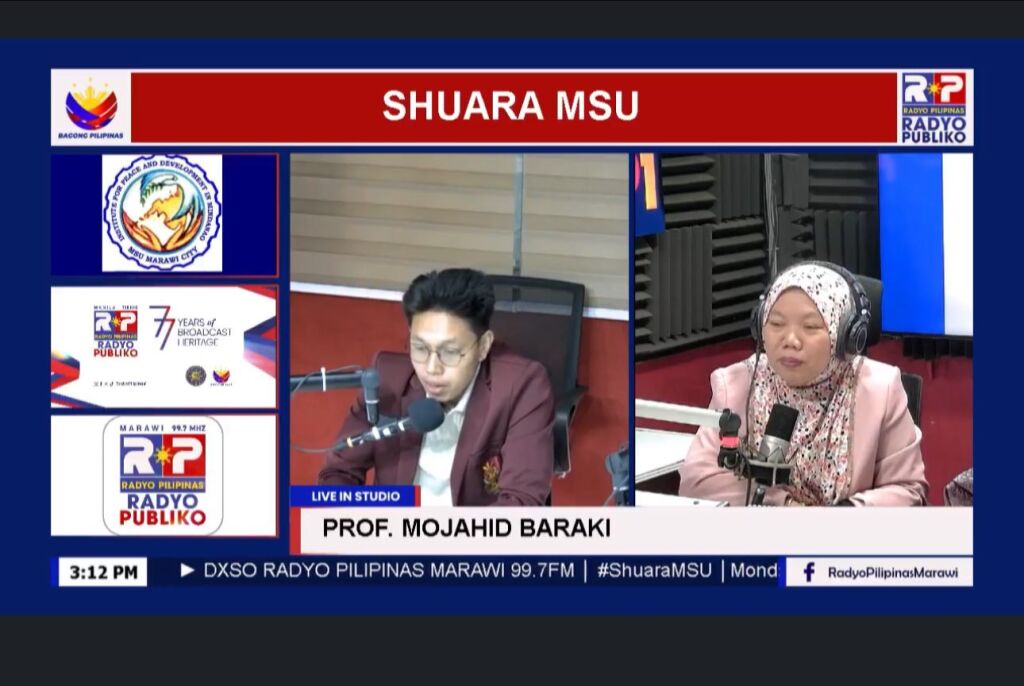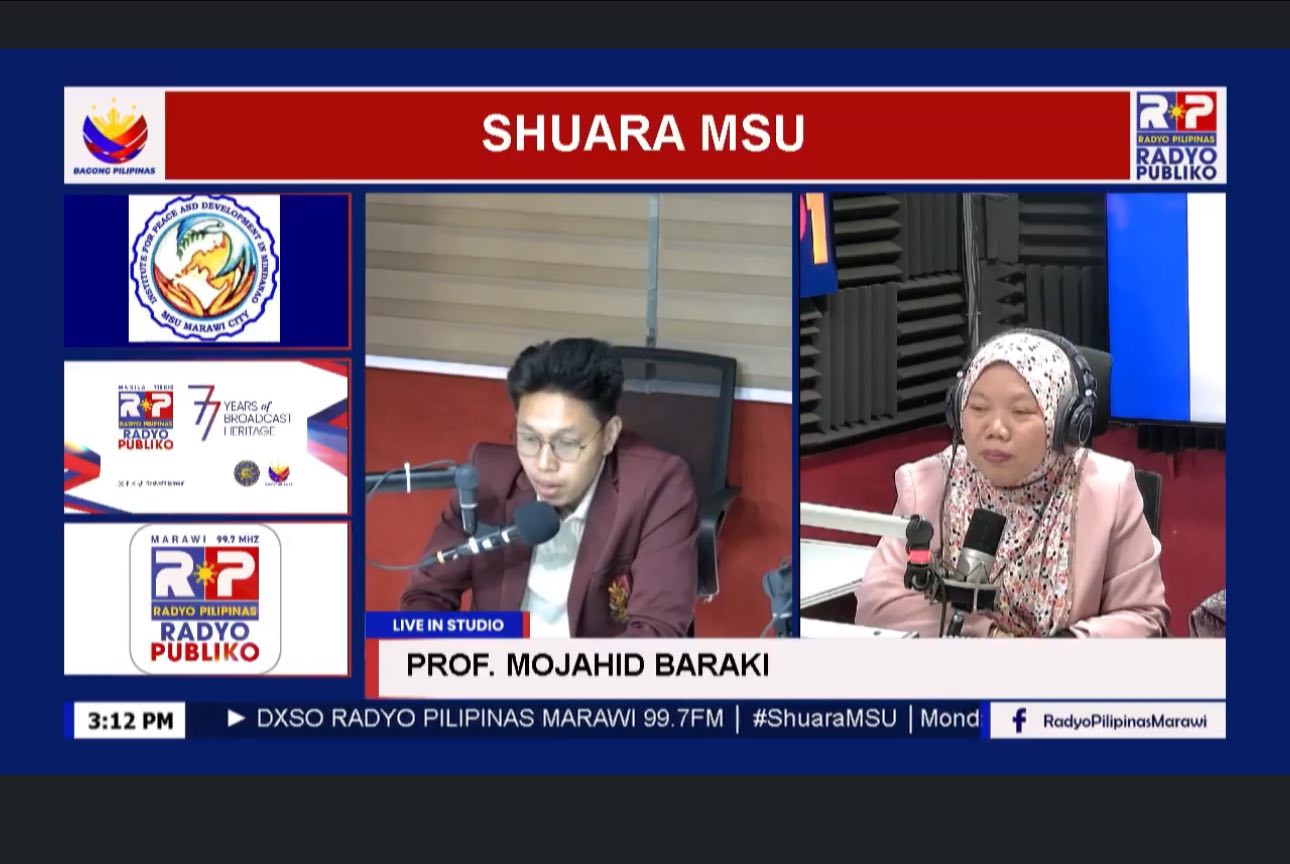By Aliah Pacalna Cali-Pascan, JD., DPA
In a recent appearance on Radyo Pilipinas Marawi’s ShuaraMSU program, Professor Mojahid Baraki, a faculty member of the History Department and an Associate Peace Education Officer, shared his compelling journey from academic theory to grassroots reality.
The program, hosted by Dr. Aliah P. Cali-Pascan, is part of the initiatives of Institute for Peace and Development in Mindanao and Radyo Pilipinas Marawi, which is managed by Baelabi Shora Sarigala. Opening with a warm sallam to all listeners, Prof. Baraki’s story is a powerful testament to the inseparable link between understanding the past and building a peaceful future.
Prof. Baraki’s work with the Institute for Peace and Development in Mindanao (IPDM) began when he joined a research team focused on community-based Alternative Dispute Resolution (ADR) in various provinces. He recalls his assignment to the island provinces, an experience that offered him the unique opportunity to visit other MSU campuses in Sulu and Tawi-Tawi. This fieldwork provided a stark comparison in the application of ADR. While communities in Lanao often rely on traditional resolution methods, he observed that the lupon tagapamayapa in the island provinces are significantly more empowered and effective. Beyond this, he shared that IPDM has been actively involved in side events for the International Conference on Women, Peace, and Security, and he has had the opportunity to present his research papers abroad. He is also engaged in vital community services, such as the MNLF Transformation Program.
His passion for history, he revealed, was ignited during his high school Aralin Panlipunan classes. Assessing his strengths and interests, he candidly admitted, “I assessed myself that I am not interested in math and sciences so I go with History.” This self-realization led him to shift his academic path from BS International Relations to BA History, a decision that would define his professional purpose.
For Prof. Baraki, the relationship between history and peace is undeniable. “When you identify conflict, you always tend to discuss the history,” he explained. He cited the historical conflicts rooted in colonialism, the valiant struggles of our ancestors, and the subsequent illegal annexation of their lands as crucial sources of struggle. Understanding these historical injustices, he argues, is fundamental to effective peace education. It is why topics like transitional justice and reconciliation are central to his work. He underscored a key philosophy: the purpose of reflecting on the past is “to learn a lesson from it and appreciate what we have.”
Prof. Baraki highlighted a significant challenge of the present generation: the lack of awareness about pivotal historical events. He noted that many young people today have no idea of what happened during the Jabidah Massacre in 1968, the struggles of their ancestors, or the experiences of their forefathers during Martial Law. To achieve lasting peace, he stressed the importance of educating the youth about the past, particularly the Bangsamoro struggle. He made a powerful point, emphasizing that the peace and opportunities we enjoy today in the BARMM are the “resulta ng bunga ng dugo at pawis ng ating mga forefathers” (the result of the blood and sweat of our forefathers).
This sentiment was echoed by Dr. Cali-Pascan, who was also part of the conversation. She likened the establishment of Mindanao State University itself to the “dugo at pawis” of countless individuals. Prof. Baraki wholeheartedly agreed, affirming that the education and peace we now enjoy are indeed a result of immense “dugo at pawis and sacrifices.” Dr. Cali-Pascan further highlighted that one of these blessings is the existence of fundamental peace education, and she inquired about Prof. Baraki’s initiatives to improve it. In response, he shared that his team has been actively working on four key enhancements, which they have held in various locations, including General Santos City and Iligan.
This mission to bridge the gap between academic theory and grassroots reality is at the heart of his work. As he explained, being a peace advocate is his extension service, an opportunity to move beyond the “idealistic” classroom setting and engage with the harsh realities of community life. Visiting communities, he said, provides a vital grasp of what is truly happening at the grassroots level, particularly among those who are still struggling with the lingering problems of the past. This clash between theory and reality presents a unique challenge for him as an educator. He acknowledged the difficulty of introducing concepts like unity and harmony to students when historical narratives are marked by division and concepts like “divide and rule.”
Dr. Cali-Pascan then pivoted the conversation to a crucial point in his career: his decision to pursue a doctorate in history at the University of the Philippines. Prof. Baraki explained his motivations with a blend of professional pragmatism and personal ambition. “The practical reason is the need of our history department,” he stated, highlighting that a doctorate is essential not only for professional growth but also for departmental accreditation. He views it as an an alignment with his field of specialization, a necessary step to advance his expertise. With a mix of humility and determination, he expressed his aspiration to meet the rigorous standards of the University of the Philippines, noting that to succeed there is to be “proven and tested.”
Asked how he envisions his doctoral study connecting history with peace, Prof. Baraki acknowledged that this very connection is a central struggle. His planned dissertation, he revealed, will focus on “peace history in Bangsamoro.” He cited historical examples, such as treaties forged by Sultan Kudarat that included sanctions for non-compliance, as a rich area for research. With the availability of digitized sources, he noted that the study and writing of history are now far more flexible than before, opening up new avenues for scholarly work.
Looking ahead, he emphasized that the conversation on peace is “walang katapusan” (endless), underscoring his commitment to contributing to the new generation’s understanding of this ongoing journey. His ultimate goal is to apply his advanced research to the pressing issues of peace and conflict in the region.
To this end, Prof. Baraki also used the opportunity to passionately promote his department, inviting high school graduates to enroll in the Bachelor of Arts in History program. He explained the benefits of the degree and proudly announced that the department also offers a Master of Arts in History, demonstrating the institution’s commitment to nurturing the next generation of historians and peace advocates.
Ultimately, Prof. Baraki’s work is about making peace between these conflicting ideas and perceptions. It is a continuous process of reconciliation—not just of historical conflicts, but also of academic ideals with the complexities of real-world struggle. His journey is a powerful reminder that true education and peacebuilding require us to leave the comfort of the classroom and engage with the communities we serve, making history not just a subject to be studied, but a lived experience to be understood, appreciated, and healed.



